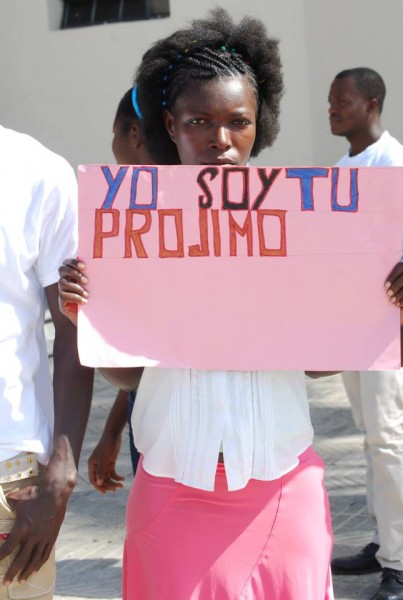
[“#YouDon'tDoThat: Strip the Nationality from Thousands of Dominicans”] Campaign “Reconoci.do” [Recognized]. Image taken from its Facebook page.
Ruling no.168-2013 (PDF) [es], dictated by the constitutional court, has turned the international community on its head. Polarization within the country has also become more palpable, and debates seen in social media networks and the press haven't ceased for a minute.
Nobel Prize winner in Literature, Mario Vargas Llosa, published the controversial article “The Pariahs of the Caribbean” [es] in El País in which he compares the sentence to Nazi laws against the Jews. He also highlights the complexity of the Dominican State in this undocumented migration process:
A la crueldad e inhumanidad de semejantes jueces se suma la hipocresía. Ellos saben muy bien que la migración “irregular” o ilegal de haitianos a la República Dominicana que comenzó a principios del siglo veinte es un fenómeno social y económico complejo, que en muchos períodos —los de mayor bonanza, precisamente— ha sido alentado por hacendados y empresarios dominicanos a fin de disponer de una mano de obra barata para las zafras de la caña de azúcar, la construcción o los trabajos domésticos, con pleno conocimiento y tolerancia de las autoridades, conscientes del provecho económico que obtenía el país […]
Hypocrisy is added to the cruelty and inhumanity of those judges. They know very well that the “irregular” or illegal migration of Haitians to the Dominican Republic beginning in the early 20th Century is a complex social and economic phenomenon, which at times – precisely, times of greater prosperity – has been encouraged by land-owners and Dominican business owners in order to benefit from cheap labor for the sugar cane harvest, construction or housekeeping. All this with full knowledge and tolerance from the authorities, themselves conscious of the economic advantage that the country obtained […]
International organizations Amnesty International and Human Rights Watch have also denounced the Constitutional Court's decision.
Economist and historian, Bernardo Vega, has made claims about the topic for the program El Despertador [es] where he reiterated that:
Es el estado que tiene un compromiso moral con esas personas por traerlos aquí.
The state has a moral commitment to those people for having brought them here.
After scrutinizing the country's history from before the World War I to the present day, he strongly concludes that the Dominican Republic is knowingly responsible for these irregularities.
On the other hand, the historian Rosario Espinal's article Matanza Electoral [es] [Electoral Slaughter], airs a different perspective. Published in her blog and in several nationally circulated newspapers, the article asserts that the drastic measures taken by the Constitutional Court respond to political interests and not to a racist war. In her words:
Desnacionalizar los dominicanos de ascendencia haitiana tiene como objetivo inmediato sacarlos del registro electoral para que no puedan votar, y para eso tenían que sacarlos del registro civil, y para eso, el Tribunal Constitucional hizo vericuetos jurídicos hasta llegar a 1929. Los mataron electoralmente a todos de un porrazo, haciendo legal lo ilegal. He aquí el nuevo orden constitucional dominicano.
The immediate objective of denationalizing Dominicans of Haitian descent is to remove them from the electoral roll, thus, preventing them from voting. For this reason, they had to be removed from the civil register and to do that, the Constitutional Court made several legal loopholes until it arrived at 1929. They killed them electorally in one fell swoop and in doing so, legalized the illegal. Behold the new Dominican constitutional order.
What ever the reason for this ruling unrest has spread. On the 4th November, the coalition Dominicanos y Dominicanas por el Derecho de la Región Enriquillo [Dominicans for the Rights of the Enquillo Region] congregated and marched in the bateyes zone [rural communities situated in the outskirts of the sugar-producing district], reaffirming their rejection of the denationalization of Dominicans of Haitian descent. A myriad of NGOs and social activists have also demonstrated against the sentence.
Meanwhile, a neo-nationalist movement has repeated again and again slogans such as “Death to the traitors” and “Them over there, us right here”
in an act celebrated in the Altar de la Patria, [es] [the Altar to the Motherland] on the 5th November. Those responsible for said demonstration have advocated for national sovereignty on the basis of the premise that “later there won't be a motherland” if the decision is not defended.The position of president Danilo Medino has not been able to calm the waters; far from pronouncing himself as being against these measures, he has held diplomatic meetings with dozens of ambassadors in which the scope of the sentence has been explained.
For now, we can only wait and see if international pressure, and rioting in this country, manage to push the different political entities into amending the damage caused by the fateful sentence No.168-2013.








4 comments